人教版八年级上册英语教案 Unit 7 第1课时
(人教版)八年级英语上册unit7_will_people_have_robots_第一课时至第五课时_全-2019精选
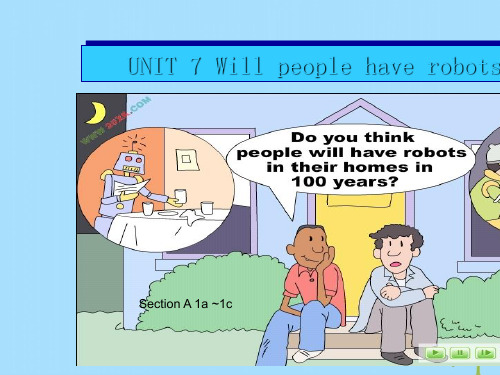
Please talk with your partner.
There will be… People will have…
1a How will the world be different in the future, 100 year these predictions. Check (√) A (for agree) or D (for disa
A: Where do you live ? B:I live in … . A: Where did you live ten years ago ? B:I lived in … A: What do you do ? / What’s your job ? B: I’m a/an … . A: What do you think you will be in ten years ? B:I think I will be … . A: Where will you live ? B:I will live in … .
evening. will help
• 4. They _____w_i_ll_p(lpalyay) soccer if it doesn
• 5. We _________ (have) a meeting tomor
will have
3a Some more predictions about things.
tenn. is a b.aby
一般将来时:动词在 原形。
3b PAIRWORK Look at activity 3a. Make predictions about Sally.
A: What do you think Sally will be in five years?
人教版初中英语八年级上册Unit-7阅读课教案
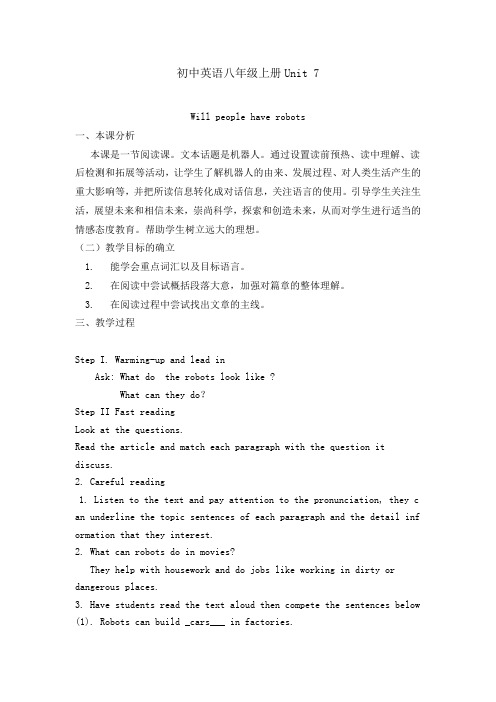
初中英语八年级上册Unit 7Will people have robots一、本课分析本课是一节阅读课。
文本话题是机器人。
通过设置读前预热、读中理解、读后检测和拓展等活动,让学生了解机器人的由来、发展过程、对人类生活产生的重大影响等,并把所读信息转化成对话信息,关注语言的使用。
引导学生关注生活,展望未来和相信未来,崇尚科学,探索和创造未来,从而对学生进行适当的情感态度教育。
帮助学生树立远大的理想。
(二)教学目标的确立1.能学会重点词汇以及目标语言。
2.在阅读中尝试概括段落大意,加强对篇章的整体理解。
3.在阅读过程中尝试找出文章的主线。
三、教学过程Step I. Warming-up and lead inAsk: What do the robots look like ?What can they do?Step II Fast readingLook at the questions.Read the article and match each paragraph with the question it discuss.2. Careful reading1. Listen to the text and pay attention to the pronunciation, they c an underline the topic sentences of each paragraph and the detail inf ormation that they interest.2. What can robots do in movies?They help with housework and do jobs like working in dirty or dangerous places.3. Have students read the text aloud then compete the sentences below (1). Robots can build _cars___ in factories.(2).They can do __simple__ jobs many times and never get bored.(3).Some can __walk___ and _dance____.(4).Some can help __look for ___ people under _the buildings_____. 4.Write T or FScientists in Japan can make robots walk and dance.Some scientists believe it will be difficult for robots to look like a humanJames White thinks robots can talk like humans in the future.Step III. After-reading(1)About whether robots can think , do scientists have the same ideas?(2)What are the different ideas?(3) Which idea are you on? Say why.StepⅣ.Homework1. Recite the new words and expressions in the article.2. Write a short paragraph.For example: I want to have a robot in the future. It will look lik e a ______. It will be able to_____, and it will also be able to help me _______________________________________________... .I think I will like it very much.3. Ask S to finish 2d-2e.四、教学反思本节课的设计从激发学生的兴趣开始,由易到难,逐步完成各个环节,尤其注意文本信息的思考、评价和转换,使学生找到了学习兴趣。
新人教版八年级上册英语Unit7 教案
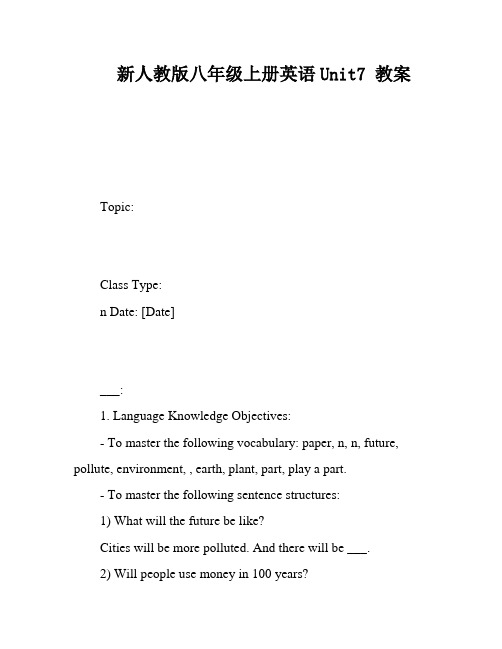
新人教版八年级上册英语Unit7 教案Topic:Class Type:n Date: [Date]___:1. Language Knowledge Objectives:- To master the following vocabulary: paper, n, n, future, pollute, environment, , earth, plant, part, play a part.- To master the following sentence structures:1) What will the future be like?Cities will be more polluted. And there will be ___.2) Will people use money in 100 years?3) Will there be world peace?4) Kids will study at home on computers.5) They won’t go to school.- ___ the use of "will + verb" to express the simple future tense.2. Attitude and Value Objectives:- To guide students to look forward to the future and design their future lives, so as to achieve the goal of prospect ___.___:1. To learn and master the meaning and structure of the simple future tense.Teaching Difficulties:- To master the use of "more/fewer" and "more/less".___:___:___:I. Lead-in1. Show students some pictures of robots on the big screen and ask them to talk about their future jobs and plans: "What do you want to be when you grow up?"Ss: "I want to be a scientist."T: "How are you going to do that?"Ss: "I’m going to study science hard."...2. Use the pictures to guide students to the topic of robots.II. nIII. Game IV. Listening V. Pair work1. The teacher reads the first n in 1c and then has the students read it in pairs.2)掌握情态动词will来表达一般将来时态这一语法知识;教学难点:运用will来表达一般将来时态的句子构成和用法。
给你不一样的英语课:八年级上Unit7教案

给你不一样的英语课:八年级上Unit7教案。
八年级上Unit 7教案的重点在于让学生变成主动学习者。
这意味着在教师的带领下,学生可以自行探索英语的知识和规则,让学生不再只是被动吸收知识而是学会主动思考。
例如,在介绍动名词时,教师并不会仅仅给出正确的答案,而是让学生根据给出的句子自己去发现动名词,并了解其使用方法。
这种让学生自己找寻答案的方法能够让学生更加深入理解英语规则,能够加强学生在英语学习中的主动性、积极性和自信心。
这个教案还添加了互动环节。
教师在教学过程中设计了多个合作小组的环节,让学生在小组中讨论并尝试解决问题。
这不仅可以培养每个学生的合作精神,而且还增加了学生对于英语学习的兴趣。
在小组中讨论是不同于单独学习的,学生们能够交流彼此的策略,分享学习经验,相互促进,从而取得更好的成果。
值得一提的是,教师还采用了许多多媒体辅助教学过程,例如使用视频、图片等工具来更好地丰富教学内容,让学生实现多媒体手段在英语学习上的应用,提高学生的视听能力,让学生在不断适应不同环境中掌握英语知识。
八年级上Unit 7教案给予了学生与传统英语课不同的学习体验。
教师从不同角度仔细规划和设计课程,充分利用小组合作、互动沟通等形式,调动了学生的学习热情和积极性,增强学生主动性、创造性和思维能力。
在未来的日子里,教师们应该更加关注学生的需求,为
学生们提供更加智能化、有趣和贴近生活的教学资源,让走进课堂的每一位学生都能够享受到这样的学习体验。
英语人教版八年级上册 Unit7_第1课时_精品课件(河南郑州)
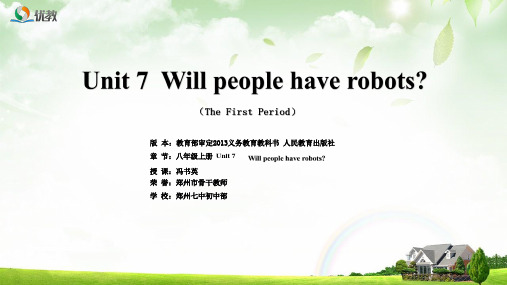
Boy 2: Yes, I do. I saw a robot on TV, and it cleaned the kitchen.
Boy 1: Well, I don't think people will use money.
Boy 2: Do you think everything will be free?
Boy 1: I think kids won't go to school. They'll study at home on computers.
Bo2: Oh, I disagree.
Boy 1: You do?
Boy 2: Yeah, there will always be schools.
FREE
There will be only one country in 100 years.
People won’t use money. Everything will be free in 100 years .
What will life be like in 50 years?
the time after 50 years from now
Wednesday. Clara: You're right. But what can I do?
Pete: Look, Why don't I come round to your place this afternoon after school? We can look at the Maths together. You 7.will findit's not so difficult.
When there is a pronoun before “will”, we oftern use the short form, such as we'll, they'll, that'll.
人教版八年级英语上册Unit7教案(表格式三维目标)
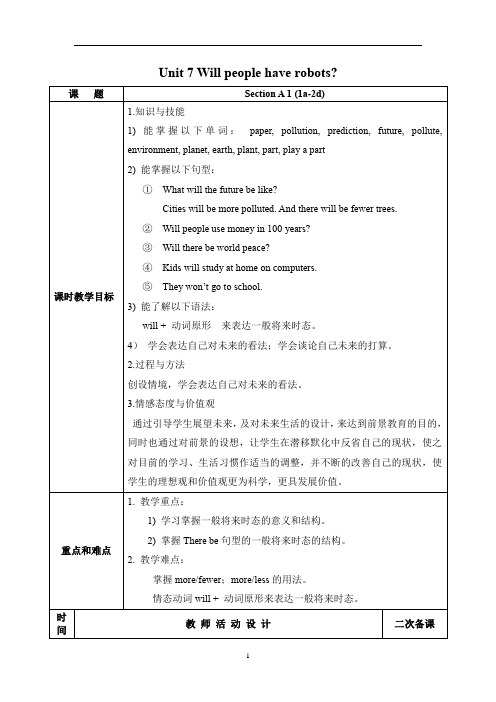
Unit 7 Will people have robots?答语:Yes, there will. / No, there won’t.三、可数名词1. more +不可数名词2. less + 不可数名词3. fewer + 可数名词Ⅳ. PracticeWork on 3a:1. Tell Ss to read the conversation in 3a and try to fill in the blanks withmore/ less or fewer.2. 方法指导:应通读整个对话,掌握对话大意;然后,根据空格后的名词是可数名词还是不可数名词来确定是用more, less 还是fewer。
注意,有些名词前有形容词来修饰。
3. 最后,教师与同学们一起校对答案,并对学生们有疑问的地方进行解释。
4. 学生们阅读这些句子并试着记住这些句子。
Work on 3b:1. 让学生们阅读句子的开头,明白每个句子的意思。
2. 让学生们思考一下针对这一情况,在将来会发生什么样的情况。
3. 让学生们互相检查自己所写的句子,发现并改正错误。
4. 让部分学生说一说自己所写的句子。
大家一起改正句子中的错误。
Ⅴ. Group work1. 小组中的同学们对未来的城市进行讨论。
2. 每个成员发表自己的想法,小组长进行记录,并进行汇总。
3. 最后,同学们根据小组成员的想法,然后,展开想象,试着每名同学们画一幅未来城市的画。
4. 最后,比较一下每个小组的画,看哪个小组画得较好。
5. 试着对自己小组里的情况用英语做成一个报告。
Ⅵ. ExercisesIf time is enough, do some more exercises on big screen.Homework1. 复习Grammar Focus 中的内容。
展开你想象的翅膀,想一下50年后,你的生活将会怎么样?并写六个句子来描述一下。
In fifty years, …教学反思。
【人教版】新目标2020年八年级英语上册Unit7单元教案
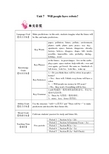
Unit 7Will people have robots?本单元围绕“谈论未来”及“提出问题”这两个话题,设计了相关的活动,从听、说、读、写四个方面,帮助学生掌握运用本单元的重点语法“一般将来时表示猜测”的用法,对学生三种时态的运用能力进行综合训练,帮助学生形成创造性地运用所学三种时态的能力。
第一课时Section A(1a-2d)Teaching Goals【教学目标】Key words:paper,pollution,prediction,future,pollute,environment,planet,earth,plant,partKey phrases:make predictions,live to be 200 years old,in 100 years,free time,on computers,go to school,in great danger,live on the earth,play a part in Key sentences:1. Will people use money in 100 years?2. People will live to be 200 years old.3. There will be fewer trees and the environment will be in great danger.Teaching Key Points【教学重点】The vocabulary:paper,future,pollute,pollution,environment,part,in 100 years,in great danger,play a part inTarget language:Will people use money in 100 years?No,they won't. Everything will be free. Will people live to be 200 years old?Yes,they will. What's your prediction about the future?I think there will be more pollution.Teaching Difficult Points【教学难点】1.will构成一般将来时态的句式。
新人教版八年级上册英语 Unit 7 第1课时 教案(教学设计)
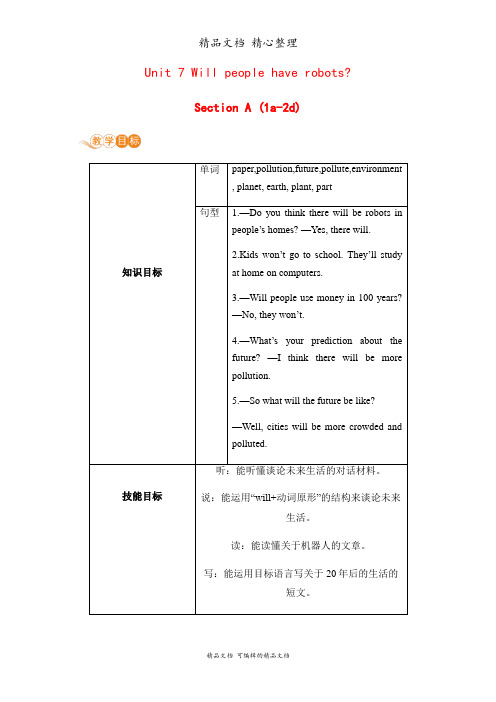
Unit 7 Will people have robots?Section A (1a-2d)单词paper,pollution,future,pollute,environment1.掌握一般将来时的意义和结构。
2.掌握There be句型的一般将来时的结构。
1.掌握more/fewer;more/less的用法。
2.“will +动词原形”表达一般将来时态。
Step 1以机器人相关视频来导入新课,调动学生学习的积极性。
Warming up and leading inShow Ss a video about robots and ask them some questions after watching it:What can you see in the video?Do you think it possible that every home has a robot?What can robots do for us?Step 2用形象的方式帮助学生掌握新词汇。
让学生在预测的过程中加深对词汇的理解。
1.New wordsShow Ss some pictures of the new words in this period: paper, pollution, future, planet, earth, plant.2.Work on 1a①Ask Ss to read the predictions in 1a. Let them think about how the world will be different 100 years from now.②Get Ss to check (√)A for agree or D for disagree. Then check the answers with the class together.【Keys: Answers will vary.】Step 3让学生在听的过程中掌握抓住关键信息的方法。
- 1、下载文档前请自行甄别文档内容的完整性,平台不提供额外的编辑、内容补充、找答案等附加服务。
- 2、"仅部分预览"的文档,不可在线预览部分如存在完整性等问题,可反馈申请退款(可完整预览的文档不适用该条件!)。
- 3、如文档侵犯您的权益,请联系客服反馈,我们会尽快为您处理(人工客服工作时间:9:00-18:30)。
第一课时Section A(1a-
2d)
根据句意及音标提示写出单词及其汉语意思。
1.There was no prediction /prɪ'dɪkʃn/ for this earthquake.
2.They have to fight against pollution /pə'luːʃn/ to protect the environment /ɪn'vaɪrənmənt/.污染;污染物;环境
3.The earth /ɜː(r)θ/ is one of the hottest planets /'plænɪts/.地球;行星
4.We should plant /plɑːnt/ more trees and keep the air clean.种植
5.The story is very interesting.It is part /pɑː(r)t/ of the novel.部分
环节1新课导入
T:There are many different kinds of robots in the world.The three robots in the pictures above are from films Wall·E and Big Hero 6.Do you like robots?Yes or no?Tell me the reasons.
S1:Yes,I like robots,because they can do everything for us.
S2:No,because they look ugly and has no temperature and feelings.
...
设计意图:通过图片的呈现,以直观的方式展现学生们熟悉的机器人原型;同时通过师生问答的方式,让学生自己阐述关于机器人意见,从而更顺利地引入到本课时的学习中去。
环节2学习1a-1c
1.先抽选2位学生分角色表演P49图片中的对话,再根据对话内容和左侧方框中的语言目标猜测本课时的主题。
2.让学生阅读1a下方列出的预测,同意的在A(agree)前打钩,不同意的在D(disagree)
前打钩。
3.放一遍录音,完成1b的练习,让学生将听到的预测圈出来。
4.再放一遍录音,让学生逐句跟读对话,整体感知。
然后老师核对1b的答案。
5.结对练习。
以1c方框中的对话为例,让学生就1a中的预测进行问答练习。
老师抽选一两组在课堂上表演。
设计意图:此环节通过听说读写的方式让学生的综合能力的得到了有效锻炼,鼓励学生学以致用。
环节3学习2a-2d
1.让学生们先阅读2a和2b的题干及内容,再播放两遍录音,完成相应练习。
2.再放一遍录音,学生进行逐句跟读,整体感知。
然后老师核对答案。
3.对话练习。
让学生结对练习,就2a和2b中关于将来的预测练习对话。
最后老师抽选几组学生进行当堂表演。
4.播放2d的录音,学生进行逐句跟读(注意语音、语调、连读等细节),理解其主旨大意,并标出对话中的生词、重点短语和难句,老师进行讲解。
5.让学生分角色表演2d的对话,最后抽选一两组学生在课堂上表演对话。
6.要点点拨。
(1)There will be(more/less/fewer)people.
①本句是there be句型的一般将来时的肯定句形式,其结构为:There will be+主语+其他.其一般疑问句形式是将will提到there之前。
肯定回答为:Yes,there will.否定回答为:No,there won't.
②【辨析】more、less与fewer
more更多的,是many和much的比较级,既可修饰可数名词复数,也可修饰不可数名词;less较少的,更少的,是little的比较级,修饰不可数名词;fewer较少的,更少的,是few的比较级,修饰可数名词的复数。
(2)I don't think so.
该句一般用在别人提出某观点之后,表示不同意对方的观点或看法时,也可用语气更委婉的“I'm afraid not”表示;若同意对方的观点或看法,则用“I think so”或“I'm afraid so”等表示。
(3)So what will the future be like?
句型“What+will+主语+be like?”用于询问某人或某物将来的状态或性质,相当于“How+will+主语+be?”意为“……将会是什么样呢?”
7.学以致用。
(用所给词的适当形式填空)
(1)If I were you,I would take more exercise and eat less (little) meat.
(2)More action must be taken to stop pollution(pollute).
(3)I think there will be fewer (few) homeless people in the future.
(4)Many famous predictions (predict) didn't come true.
(5)He lives (live) in a big city now.He will go(go)to the country next month.
设计意图:通过2a和2b的听力练习,让学生学会更精准地抓取目标语言,初步掌握一般将来时的运用和本单元的主旨;分角色表演对话的练习,既锻炼了学生的语言表达能力,也活用了本课时学到的句型和词汇,对所学知识进行了巩固和记忆。
请完成本课对应训练!。
